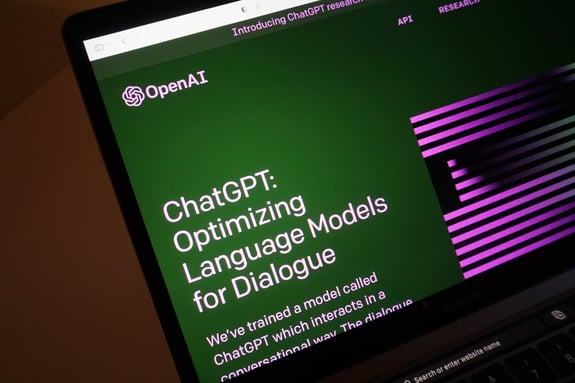In January, we published a blog post explaining why we won't be using generative AI writing assistants any time soon. The bottom line is that we just don't feel that the quality of the writing they produce is anywhere close to what our clients expect and what we know will help them achieve their goals.
However, that is not to say that we haven't embraced artificial intelligence in general, for we absolutely believe in its ability to make content marketers like us better at our jobs.
In fact, we already use AI in a number of ways, and we are excited about AI's potential to improve the writing process as a whole. That's the reason why we tested AI writing assistants in the first place. While we feel that AI bots aren't capable of replacing human writers when it comes to the type of insightful, analytical, and creative writing that we produce, we also feel that AI plays an important role in the content development process as a whole.
For instance, we rely on AI tools from companies such as Ahrefs, Neuroflash, StoryLab.ai and others to help us decide what topics to write about in the first place. They are excellent tools to shed light on what topics are trending in certain areas and which headlines are most likely to drive engagement.
We also use Grammarly's AI tools to help edit as we write. Grammarly gives us intelligent guidance on usage, grammar, copyedits, and more, so that our writing is as crisp and clear as possible. We've also explored AI-based tools such as Phrasee and Acrolinx to help our writers maintain consistency with our client's style, tone of voice, and brand messaging.
We've even experimented with tools such as Uberflip and PathFactory, which use AI to help companies deliver the right content to the right person at the right time.
And some day soon, we will likely start using AI writing assistants like ChatGPT, Jasper.ai, Peppertype and others. We won't rely on them to produce content all on their own. And frankly, we don't foresee a day where the bots by themselves can produce content that provides the type of authority our clients are looking for. But we can see how they are helpful in putting together outlines, brainstorming ideas, and helping our writers get unstuck when they're experiencing writer's block.
There are still a lot of questions to be answered about the efficacy of artificial intelligence in content marketing. One very important question is how Google's search algorithms will look upon AI-generated content, and whether it will actually help or hurt a site's rankings. Other questions involve how willing marketers are to trust the accuracy of AI content, whether we're content to trust AI's sources, how comfortable we are with the unintentional biases that come along with using AI, and many more.
These questions will be answered in time. For now, we are excited about AI's potential to help our human writers reach new levels of creativity and imagination, and we are proud to use AI in a number of ways to make us even better at what we do.

